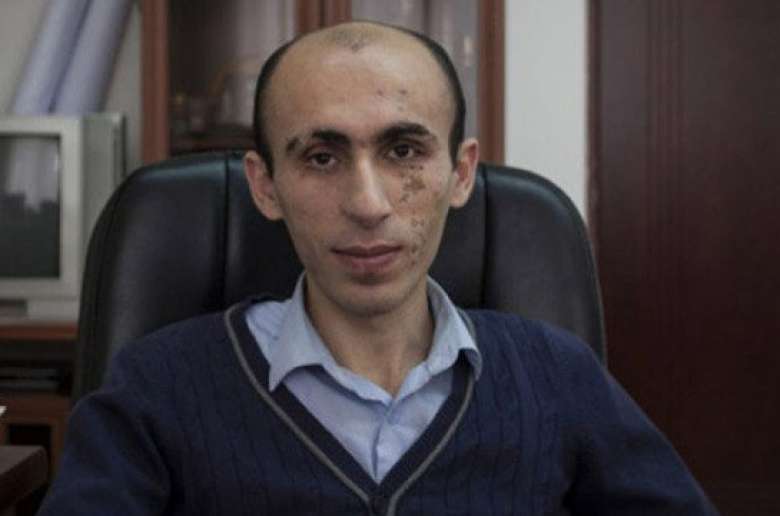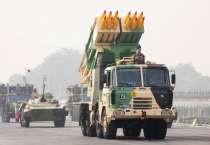Karabakh ex-official to National Journal: Azerbaijan not preparing for peace but for war with Armenia
Interviews
The National Journal, one of the most cited newspapers in the US Congress, published an extensive interview with former Artsakh (Nagorno-Karabakh) official Artak Beglaryan, within the framework of his and Artsakh Human Rights Acting Defender Gegham Stepanyan's recent visit to the US.
“Artak Beglaryan was previously the minister of state and human rights ombudsman for Nagorno-Karabakh, a disputed territory in the Caucasus region. The international community recognizes Nagorno-Karabakh as part of Azerbaijan, but throughout history, most of the region’s population has been ethnic Armenian. In September last year, Azerbaijan’s forces drove the estimated 150,000 ethnic Armenians of Nagorno-Karabakh out of the region, making them refugees. Between December 2022 and the exodus in September 2023, Azerbaijan blocked all goods and people from entering or leaving Nagorno-Karabakh, sparking a humanitarian crisis that raised alarm bells in Congress. Beglaryan, who lost his eyesight as a child due to a land-mine explosion, spoke to Cristina Maza about his recent trip to Capitol Hill and how Nagorno-Karabakh’s Armenians are advocating for their right to return home. This interview has been edited for length and clarity,” the National Journal wrote. Below is the text of this interview.
You say that the U.S. is complicit in what happened in your region. Why?
Firstly, the U.S. is a United Nations Security Council member. Secondly, it’s a great power. It’s a pioneer for human rights, democracy, genocide prevention, et cetera. Thirdly, the U.S. [ratified] the genocide convention and also has a duty in that regard. And fourthly, the U.S. is one of the co-chair countries of the OSCE Minsk Group, which was the internationally recognized format of mediators for Nagorno-Karabakh’s conflict settlement.
Azerbaijan used the so-called peace talks to commit genocide. The U.S. did nothing to prevent this genocide. During the blockade, nothing was done to pressure Azerbaijan. That was also true during the September aggression and displacement, and it’s true even now. Azerbaijan wants to turn the page on Nagorno-Karabakh, our return, and our collective rights.
That’s why we consider the U.S. complicit. There were three U.N. Security Council emergency meetings during the blockade of Nagorno-Karabakh, but no resolution was introduced or adopted. The U.S. even blocked some of the resolutions because they considered them unconstructive because they expected Azerbaijan to have constructive talks.
Why do you say Azerbaijan committed genocide against Nagorno-Karabakh’s Armenians?
A lot of international experts said that it was a genocide, including former United Nations expert on genocide Juan Mendez and Luis Moreno Ocampo, the former International Criminal Court prosecutor. The Genocide Convention says that if a country wants to destroy partially or fully an ethnic group or religious group, it’s genocide. It’s clear that Azerbaijan wanted to destroy us. However, there is a denial in the international community because they don’t want to take responsibility for this genocide, and they also think it will hinder peace talks between Armenia and Azerbaijan.
What do U.S. lawmakers and congressional offices tell you when you meet them? What conversations are you having?
They all say we have the right to return. We also talk about sanctions. They say U.S. military aid to Azerbaijan should be stopped. That’s another way that the U.S. is complicit, because even after the 2020 aggression, the U.S. continued to provide Azerbaijan with military aid.
[Section 907 of the U.S. Freedom Support Act bans direct U.S. aid to the Azerbaijani government, but successive administrations have used their authority to waive the restriction to sell military equipment and other assistance to Azerbaijan.]
We hope military aid will be stopped by Senate Resolution S. 3000 [the Armenian Protection Act of 2023] and by an accompanying House resolution. We also hope the U.S. will implement economic sanctions, including against individuals from Azerbaijan. We also hope the Magnitsky Act will be used against Azerbaijan.
Recently, the State Department designated Azerbaijan to its Special Watch List for religious freedom because our churches and cemeteries are being destroyed. We cannot practice our religious freedom. We say to all of them that it’s not possible to have a sustainable peace if you are not addressing our collective rights and we are not returning to our homeland. Azerbaijan is not preparing for peace. It is preparing for war with Armenia.
What has life been like for Nagorno-Karabakh’s Armenians since September? We saw caravans of Armenians leaving after being driven from their homes, but many people don’t know what happened next.
I lived in Nagorno-Karabakh’s capital, Stepanakert, with my family, including my two kids, who are 2 and 5 years old. We were there during the blockade. Eventually, I escaped by crossing a checkpoint at night. Fortunately, they didn’t notice me. Now, I live with my family in Armenia’s capital, Yerevan.
Like all refugees, we have problems with income and housing. My older daughter had some fears. Sometimes, she remembers what happened. She remembers the aggression, the bombing, the shelling because she is 5 years old. She understands what happened. She is going to a psychologist to face these fears, but all children face similar problems.
They knew the Azerbaijanis were going to kill or torture us. There were a lot of war crimes between September 19 and the end of the displacement. That’s why our people decided to flee, so that we wouldn’t be killed or arrested or tortured.
Who supports all the refugees from Nagorno-Karabakh?
The Armenian government and Armenian diaspora organizations are mostly supporting us. The Armenian government gave us money to rent an apartment for six months, but that funding will run out soon. The United Nations has given some limited financial support. But it’s not enough.
UNHCR [The U.N. High Commissioner for Refugees] said it would give $97 million in emergency funds. USAID promised $11 million in emergency funds. But even $11 million is a very small amount in terms of the needs of 150,000 refugees. That’s why we hope the U.S. government, the United Nations, and others will increase international support for our people.
On the other hand, we want to return home. We want to live there because it’s our right. We want to have safety there. We want to have international security guarantees and our dignity protected there. Is the government of Nagorno-Karabakh operating now in exile in Armenia?
The government still operates in Armenia, but we don’t have financial resources. Armenia is also under a lot of pressure from Azerbaijan to dismantle our government and close this chapter. But it’s the legitimate and legal representatives of our people, our parliament, our executive body, and we seek to keep our government system in order to represent our interests and our rights.
How involved is the Nagorno-Karabakh government in discussions between the Armenian government and Azerbaijan?
Almost not at all. One of the key problems is that our government and our civil-society representatives are not engaged in decision-making processes for our people, both in Armenia and internationally. There is no engagement. Nobody asks our opinion.
International organizations and foreign governments, including the State Department, publicly state that we have a right of return. But nobody discusses with us the conditions of that return. The ultimate goal should be our return and a safe, dignified life in Nagorno-Karabakh, including U.N. security guarantees, such as U.N. peacekeepers.
What is the primary goal of your trip to Washington?
The overall goal is to present what happened and to communicate that it was a genocide, to get sanctions on Azerbaijan, and to ensure the long-term protection of our people and our cultural heritage and property.
We also want the release of all hostages or prisoners who are in Azerbaijani captivity and jail, including a lot of our military leaders who are hostages in Azerbaijan now. Azerbaijan has confirmed that there are 23 prisoners, but we have evidence of over 100 people captured since 2020. Eight of those people are political leaders.
That’s why we want the State Department to implement sanctions and pressure the Azerbaijani authorities to release our hostages.





 US Assistant Secretary of State to visit Armenia
US Assistant Secretary of State to visit Armenia Armenia, Germany reached agreements on military-technical and military-technological cooperation
Armenia, Germany reached agreements on military-technical and military-technological cooperation When peace treaty is signed, meaning of Minsk Group is lost: Alen Simonyan
When peace treaty is signed, meaning of Minsk Group is lost: Alen Simonyan Central Bank of Armenia: exchange rates and prices of precious metals
Central Bank of Armenia: exchange rates and prices of precious metals Armenia customs attaché to Russia: Upper Lars border checkpoint reopened after being closed for about 5 hours
Armenia customs attaché to Russia: Upper Lars border checkpoint reopened after being closed for about 5 hours Food safety inspectorate: Armenia fruit exports to Russia has increased at least twice compared to 2023
Food safety inspectorate: Armenia fruit exports to Russia has increased at least twice compared to 2023 Central Bank of Armenia: exchange rates and prices of precious metals
Central Bank of Armenia: exchange rates and prices of precious metals Armenia border guard injured in mine blast in Voskepar
Armenia border guard injured in mine blast in Voskepar Azerbaijan visit not planned on Armenia PM agenda, spokesperson says
Azerbaijan visit not planned on Armenia PM agenda, spokesperson says French police arrest Ukraine-Russia national with explosives near Paris airport
French police arrest Ukraine-Russia national with explosives near Paris airport


















































 Most Popular
Most Popular 
 Gevorg Papoyan received Ambassador Extraordinary and Plenipotentiary Saha Sinha
Gevorg Papoyan received Ambassador Extraordinary and Plenipotentiary Saha Sinha























